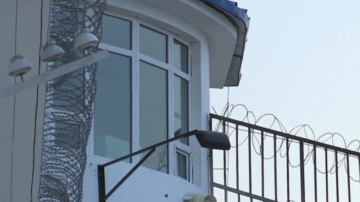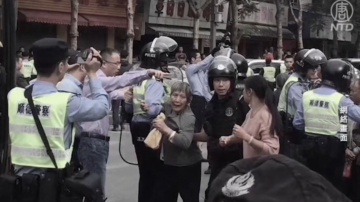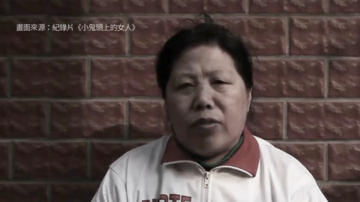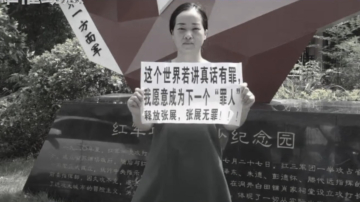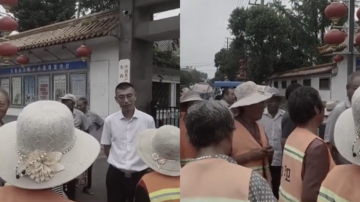【新唐人2015年02月05日訊】自然環境優美的西藏地區,有著豐富的礦產還有飲用水資源。不過,近年來,多家採礦公司對藏區的大肆開採,導致當地的生態環境不斷惡化。海外研究團體日前發佈了一份報告,對於當地藏民抗議污染的事件進行了分析,並指控中共當局對藏人表達環境保護訴求的暴力鎮壓。
2月2號,海外研究團體「西藏觀察」,受總部設在英國倫敦的非政府組織「自由西藏」的委託,撰寫了一份題為《青藏高原上的環保抗議》的報告。
《自由亞洲電臺》報導稱,「西藏觀察」環境研究小組分析了自2010年以來,發生在青海、四川、雲南和甘肅等藏區的12起環境污染群體抗議事件。
分析發現,採礦是造成抗議活動最主要的誘因。其他原因包括攔河築壩、河流污染等。西藏地區金、銀、銅、鉻等礦產資源和水電資源豐富,但是卻遭到毀滅性的開發,造成當地生態環境急劇惡化。
藏人對環境的擔憂引發了他們的抗議活動。
《美國之音》報導稱,抗議的藏人只是尋求當局執行和加強中國自己的環境法律,甚至提及中共國家主席習近平關於環境保護的講話,以避免示威被強加政治色彩。不過,大多數的抗議活動仍然遭到了暴力鎮壓。
逃亡印度的藏人邊巴澤讓:「開礦人大部分也是蓋著政府的手續,來的話當地的居民根本就沒辦法控制這些人。反而當地居民去到政府喊冤、抗議這些的話馬上給你扣上一個反革命分子,或者分裂主義分子,把你抓起來,把你打死,把你整死。這種事特別多。」
2013年10月,四川康定縣鉛礦廢水池突然溢出,毒水流進河裡造成污染,致大量魚類和家畜死亡。當地藏人把死魚傾倒在當地政府辦公地點,要求停止開採。當局卻增派大批軍警到場戒備,全面封鎖手機和網路等通訊渠道。
同年8月,青海雜多縣藏民抗議當局開採白色金剛鑽礦產資源,大批軍警出動,通過毆打、施放催淚瓦斯和開槍射擊,驅散抗議人群。
去年7月,雲南德欽縣,藏民長期信仰供奉的貢拉神山被強行開採。藏民前往礦區要求停止採礦,卻遭到上百名警察的毒打鎮壓。礦業公司的負責人還聲稱,如果藏人繼續抗議,當局有「充分的理由」打死抗議者。
逃亡印度的藏人邊巴澤讓表示,對西藏聖山和聖湖的開採,不僅僅是對環境的污染和破壞,也違背了西藏人民的傳統和宗教信仰。
邊巴澤讓:「西藏本身就是一個比較高的地方,一般生出來的草木也好,一破壞的話就很難再生長。在西藏,環境保護是跟宗教有很大關係。在我們宗教上面來說,就是你不能去破壞任何一個生態,不管是動物也好,草木也好,開山也好,這些都是不允許的。」
總部位於美國紐約的「人權觀察組織」,在1月29號發佈了《2015年世界人權報告》。
《西藏之聲》引述報告內容指出,中共當局採取監禁、巨額罰款和限制行動自由等方式,來連帶處罰自焚藏人的親屬和所屬村落社區,並強迫超過200萬的藏人農民和牧民搬遷。
西藏作家雪蓮認為,中共一貫宣揚的所謂「人能勝天」的理念,和西藏人民的信仰格格不入。
西藏作家雪蓮:「如果中共政府了解西藏的真實情況,那環境是幾千年這樣生存下來的。你要知道土生土長的人他們的理念是怎樣的,他們做出來的一些你們認為是落後和愚昧的行徑,到底是不是你們所說的真正的落後和愚昧呢?還是他們長期生存總結出來的經驗?」
另外,加拿大西藏委員會(Canada Tibet Committee)已經在1月30號,就中共政府在藏區進行的非法採礦行為,和當地藏人和平請願遭軍警鎮壓的情況,呼籲在今年6月召開的聯合國人權理事會會議中進行討論,並敦促各聯合國成員國和民間共同對中共施加壓力,使西藏境內的和平集會和結社自由權能夠得到保障。
採訪/陳漢 編輯/李明飛 後製/李智遠
Tibetan Environmental Protestors Suppressed by
Chinese Communist Regime
Tibet has a beautiful natural environment,
with an abundance of minerals and drinking water.
But in the recent years, several mining companies began to
wantonly harvest the resources of Tibet, resulting in rapid
deterioration of the local ecological environment.
Overseas research groups have just published a report that
examines the protest by Tibetans
against environmental pollution.
The report accused the Chinese Communist Party (CCP)
authorities of violently suppressing Tibetans who appealed
for environmental protection.
On Feb. 2, overseas research group, Tibet Watch accepted
a request from NGO, Free Tibet headquartered in London
and drafted a report titled, "Environmental Protests on
the Tibetan Plateau".
According to a report from Radio Free Asia, the environmental
research group “Tibet Watch” examined 12 incidents of
environmental group protests that occurred in Qinghai,
Sichuan, Yunnan, Gansu and other Tibetan areas since 2010.
The report analysed that mining is the main reason
for the protests.
Other reasons include the construction of dams
and river pollution.
The Tibetan area is rich in gold, silver, copper, chromium and
other mineral and hydropower resources.
However, these resources met with devastating development,
which caused a rapid deterioration of local ecology.
Tibetans, worried for their environment, began
a series of protests.
According to a report from Voice of America, Tibetan
protesters confined their appeals to environmental issues.
They sought for the CCP authorities to tighten their national
environmental regulations and even relied upon Chinese
President Xi Jinping’s recent speech on environmental
protection to avoid political overtones in their protests.
Nevertheless, a large number of these protests
met with violent suppression.
Pajorsang, a Tibetan who is currently seeking refuge in India:
Most of the mine harvesters have the government’s
seal of approval.
The local people cannot do anything about them.
On the contrary, when the local people appeal to the
government, they are immediately labelled as
counter-revolutionaries or separatists.
You will be arrested, beaten or put to death.
Such cases are very common.
In October 2013, Szechuan Kangding county galena’s wastewater
pond suddenly began to overflow and its toxic water flowed
into the river, causing severe pollution.
Large numbers of fish and livestock died.
Local Tibetans dumbed the dead fish at local government
quarters to demand a stop to the mining.
Instead, the local authorities deployed a large number of
riot police to stand by at the scene and completely severed
mobile, internet and other communication channels.
In August that year, Zadoi county of Qinghai province
protested against the local authorities for mining the
white diamond mineral resources.
A large batch of riot police were dispatched and dispersed
the protesting group through beating, tear gas and shooting.
In July, 2014 at Yunnan Deqin county, Gongla mountain was the
subject having historical significance as a place of worship
and faith in Tibetan religion, was forcibly mined.
Tibetans headed to the mine to demand a stop to the mining,
but were violently beaten and suppressed by
hundreds of police.
The person in charge of the mining company even proclaimed
that if the Tibetans continue to protest, the authorities will
have "sufficient reasons" to beat them to death.
Tibetan refugee Pajorsang also said that not only does the
mining of the Tibetan holy mountain and sacred lake cause
pollution and destruction to the environment, it is also home
to Tibetan tradition and faith.
Pajorsang: Tibet is a highland.
It is very hard for its trees and vegetation to grow back once
they are destroyed.
In Tibet, the concept of environmental protection is
related to religion.
In our religion, you cannot harm any part of the ecology,
be it an animal, a plant or a mountain.
It is forbidden.
Human Rights Watch headquartered in New York recently
published, the 2015 Human Rights Report on Jan. 29.
According to this report, as cited by Voice of Tibet,
the CCP authorities used imprisonment, heavy fines and
restrictions of movement to punish the relatives of the
Tibetans who self-immolated, and their village communities.
It also forcibly displaced more than 2 million Tibetan
farmers and herdsmen.
Tibetan author Snow Lotus believed that the ideology of
"man over heaven" espoused by the CCP is fundamentally
in conflict with the beliefs of the Tibetan people.
Snow Lotus: If only the CCP government understood the
true situation of Tibet, they would know that its environment
has sustained its people for many millennia.
You must understand the belief system of the native born.
Some of the things that they do are, in your opinion, stupid
and backward, but are they really so?
Or can it be knowledge gathered from life experiences
of countless generations?
The illegal mining activities by the CCP government in
Tibet area and the police’s violent suppression of peaceful
Tibetan protestors have caught the attention of the
Canada Tibet Committee.
On Jan. 30, the Committee requested for this matter
to be brought to the UN Human Rights Council session
held in June this year for discussion.
It also urged the UN member states and the civil societies
to exert joint pressure on the CCP and ensure that the
Tibetans’ rights to freedom of peaceful assembly and
association are protected.
Interview/Chen Han Edit/Li Minfei Post-Production/Li Ziyuan
2月2號,海外研究團體「西藏觀察」,受總部設在英國倫敦的非政府組織「自由西藏」的委託,撰寫了一份題為《青藏高原上的環保抗議》的報告。
《自由亞洲電臺》報導稱,「西藏觀察」環境研究小組分析了自2010年以來,發生在青海、四川、雲南和甘肅等藏區的12起環境污染群體抗議事件。
分析發現,採礦是造成抗議活動最主要的誘因。其他原因包括攔河築壩、河流污染等。西藏地區金、銀、銅、鉻等礦產資源和水電資源豐富,但是卻遭到毀滅性的開發,造成當地生態環境急劇惡化。
藏人對環境的擔憂引發了他們的抗議活動。
《美國之音》報導稱,抗議的藏人只是尋求當局執行和加強中國自己的環境法律,甚至提及中共國家主席習近平關於環境保護的講話,以避免示威被強加政治色彩。不過,大多數的抗議活動仍然遭到了暴力鎮壓。
逃亡印度的藏人邊巴澤讓:「開礦人大部分也是蓋著政府的手續,來的話當地的居民根本就沒辦法控制這些人。反而當地居民去到政府喊冤、抗議這些的話馬上給你扣上一個反革命分子,或者分裂主義分子,把你抓起來,把你打死,把你整死。這種事特別多。」
2013年10月,四川康定縣鉛礦廢水池突然溢出,毒水流進河裡造成污染,致大量魚類和家畜死亡。當地藏人把死魚傾倒在當地政府辦公地點,要求停止開採。當局卻增派大批軍警到場戒備,全面封鎖手機和網路等通訊渠道。
同年8月,青海雜多縣藏民抗議當局開採白色金剛鑽礦產資源,大批軍警出動,通過毆打、施放催淚瓦斯和開槍射擊,驅散抗議人群。
去年7月,雲南德欽縣,藏民長期信仰供奉的貢拉神山被強行開採。藏民前往礦區要求停止採礦,卻遭到上百名警察的毒打鎮壓。礦業公司的負責人還聲稱,如果藏人繼續抗議,當局有「充分的理由」打死抗議者。
逃亡印度的藏人邊巴澤讓表示,對西藏聖山和聖湖的開採,不僅僅是對環境的污染和破壞,也違背了西藏人民的傳統和宗教信仰。
邊巴澤讓:「西藏本身就是一個比較高的地方,一般生出來的草木也好,一破壞的話就很難再生長。在西藏,環境保護是跟宗教有很大關係。在我們宗教上面來說,就是你不能去破壞任何一個生態,不管是動物也好,草木也好,開山也好,這些都是不允許的。」
總部位於美國紐約的「人權觀察組織」,在1月29號發佈了《2015年世界人權報告》。
《西藏之聲》引述報告內容指出,中共當局採取監禁、巨額罰款和限制行動自由等方式,來連帶處罰自焚藏人的親屬和所屬村落社區,並強迫超過200萬的藏人農民和牧民搬遷。
西藏作家雪蓮認為,中共一貫宣揚的所謂「人能勝天」的理念,和西藏人民的信仰格格不入。
西藏作家雪蓮:「如果中共政府了解西藏的真實情況,那環境是幾千年這樣生存下來的。你要知道土生土長的人他們的理念是怎樣的,他們做出來的一些你們認為是落後和愚昧的行徑,到底是不是你們所說的真正的落後和愚昧呢?還是他們長期生存總結出來的經驗?」
另外,加拿大西藏委員會(Canada Tibet Committee)已經在1月30號,就中共政府在藏區進行的非法採礦行為,和當地藏人和平請願遭軍警鎮壓的情況,呼籲在今年6月召開的聯合國人權理事會會議中進行討論,並敦促各聯合國成員國和民間共同對中共施加壓力,使西藏境內的和平集會和結社自由權能夠得到保障。
採訪/陳漢 編輯/李明飛 後製/李智遠
Tibetan Environmental Protestors Suppressed by
Chinese Communist Regime
Tibet has a beautiful natural environment,
with an abundance of minerals and drinking water.
But in the recent years, several mining companies began to
wantonly harvest the resources of Tibet, resulting in rapid
deterioration of the local ecological environment.
Overseas research groups have just published a report that
examines the protest by Tibetans
against environmental pollution.
The report accused the Chinese Communist Party (CCP)
authorities of violently suppressing Tibetans who appealed
for environmental protection.
On Feb. 2, overseas research group, Tibet Watch accepted
a request from NGO, Free Tibet headquartered in London
and drafted a report titled, "Environmental Protests on
the Tibetan Plateau".
According to a report from Radio Free Asia, the environmental
research group “Tibet Watch” examined 12 incidents of
environmental group protests that occurred in Qinghai,
Sichuan, Yunnan, Gansu and other Tibetan areas since 2010.
The report analysed that mining is the main reason
for the protests.
Other reasons include the construction of dams
and river pollution.
The Tibetan area is rich in gold, silver, copper, chromium and
other mineral and hydropower resources.
However, these resources met with devastating development,
which caused a rapid deterioration of local ecology.
Tibetans, worried for their environment, began
a series of protests.
According to a report from Voice of America, Tibetan
protesters confined their appeals to environmental issues.
They sought for the CCP authorities to tighten their national
environmental regulations and even relied upon Chinese
President Xi Jinping’s recent speech on environmental
protection to avoid political overtones in their protests.
Nevertheless, a large number of these protests
met with violent suppression.
Pajorsang, a Tibetan who is currently seeking refuge in India:
Most of the mine harvesters have the government’s
seal of approval.
The local people cannot do anything about them.
On the contrary, when the local people appeal to the
government, they are immediately labelled as
counter-revolutionaries or separatists.
You will be arrested, beaten or put to death.
Such cases are very common.
In October 2013, Szechuan Kangding county galena’s wastewater
pond suddenly began to overflow and its toxic water flowed
into the river, causing severe pollution.
Large numbers of fish and livestock died.
Local Tibetans dumbed the dead fish at local government
quarters to demand a stop to the mining.
Instead, the local authorities deployed a large number of
riot police to stand by at the scene and completely severed
mobile, internet and other communication channels.
In August that year, Zadoi county of Qinghai province
protested against the local authorities for mining the
white diamond mineral resources.
A large batch of riot police were dispatched and dispersed
the protesting group through beating, tear gas and shooting.
In July, 2014 at Yunnan Deqin county, Gongla mountain was the
subject having historical significance as a place of worship
and faith in Tibetan religion, was forcibly mined.
Tibetans headed to the mine to demand a stop to the mining,
but were violently beaten and suppressed by
hundreds of police.
The person in charge of the mining company even proclaimed
that if the Tibetans continue to protest, the authorities will
have "sufficient reasons" to beat them to death.
Tibetan refugee Pajorsang also said that not only does the
mining of the Tibetan holy mountain and sacred lake cause
pollution and destruction to the environment, it is also home
to Tibetan tradition and faith.
Pajorsang: Tibet is a highland.
It is very hard for its trees and vegetation to grow back once
they are destroyed.
In Tibet, the concept of environmental protection is
related to religion.
In our religion, you cannot harm any part of the ecology,
be it an animal, a plant or a mountain.
It is forbidden.
Human Rights Watch headquartered in New York recently
published, the 2015 Human Rights Report on Jan. 29.
According to this report, as cited by Voice of Tibet,
the CCP authorities used imprisonment, heavy fines and
restrictions of movement to punish the relatives of the
Tibetans who self-immolated, and their village communities.
It also forcibly displaced more than 2 million Tibetan
farmers and herdsmen.
Tibetan author Snow Lotus believed that the ideology of
"man over heaven" espoused by the CCP is fundamentally
in conflict with the beliefs of the Tibetan people.
Snow Lotus: If only the CCP government understood the
true situation of Tibet, they would know that its environment
has sustained its people for many millennia.
You must understand the belief system of the native born.
Some of the things that they do are, in your opinion, stupid
and backward, but are they really so?
Or can it be knowledge gathered from life experiences
of countless generations?
The illegal mining activities by the CCP government in
Tibet area and the police’s violent suppression of peaceful
Tibetan protestors have caught the attention of the
Canada Tibet Committee.
On Jan. 30, the Committee requested for this matter
to be brought to the UN Human Rights Council session
held in June this year for discussion.
It also urged the UN member states and the civil societies
to exert joint pressure on the CCP and ensure that the
Tibetans’ rights to freedom of peaceful assembly and
association are protected.
Interview/Chen Han Edit/Li Minfei Post-Production/Li Ziyuan

